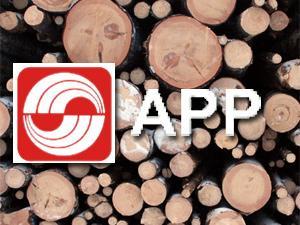 Did you know that Asia Pulp and Paper (APP) is destroying vast tracks of Indonesian rainforests, threatening the survival of precious species like the Sumatran tiger, and using an aggressive strategy of political manipulation to grow its sales? If you answered no, you’re not the only one.
Did you know that Asia Pulp and Paper (APP) is destroying vast tracks of Indonesian rainforests, threatening the survival of precious species like the Sumatran tiger, and using an aggressive strategy of political manipulation to grow its sales? If you answered no, you’re not the only one.
APP is highly proficient at using covert marketing and shady political strategies to grow its business in Indonesia and abroad. Today, NYTimes journalist Mike McIntire exposed some of APP’s questionable business practices with a frontpage piece highlighting APP’s latest antics in the U.S., including revelations of suspicious links between the company and Tea Party-esque groups like the Institute for Liberty and the Consumer Alliance for Global Prosperity.
While McIntire’s article should be enough to pique the interest of any curious reader, it really only scratches the surface of APP’s impact on the planet’s forests and climate and the company’s use of political manipulation as a business strategy. APP has wielded immense influence in the Indonesian government for decades due to the close political and economic ties between the company’s founder, Eka Tjipta Widjaja, and notorious former Indonesian dictator Suharto. APP’s record in Indonesia shows that the company has operated with near immunity from the law (it is estimated that over 50 percent of logging in Indonesia is done illegally) and almost complete disregard for the environment and human rights.
As APP expands into North American markets (the company just bought its 5th Canadian mill this week), it seems clear that we should only expect more of the same. Environmental devastation, disregard for human rights, and political manipulation are APP’s modus operandi, and groups like Consumer Alliance for Global Prosperity (CAGP) are spinning APP’s corporate interests and misdeeds into populist misinformation — manipulating APP customers and tea party advocates alike.
The good news is that RAN and others have been campaigning for the past several years to get APP to change its nasty ways. Within the last year, eight of the ten major U.S. children’s book publishers have moved away from APP and their main competitor APRIL as well as eliminated controversial Indonesian fiber from their books until it can be shown that reforms have been made in the industry.
Our team at RAN is committed to seeing this work through and to calling APP’s bluff until the company comes clean and stops destroying rainforests and misusing its power. We hope you’ll join us. Sign up to be a Rainforest-Free Paper Rapid Responder and we’ll let you know whenever there are things you can do to help hold rainforest-destroying companies like APP accountable.











